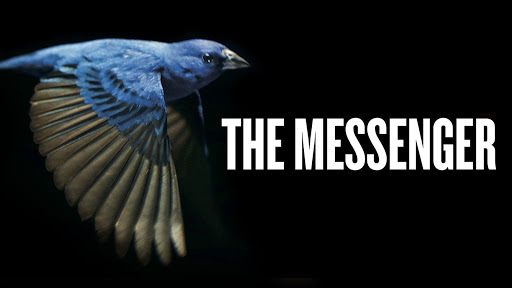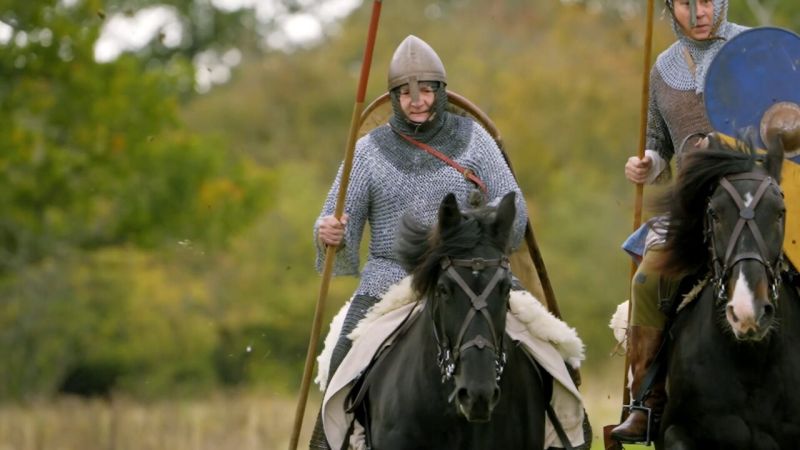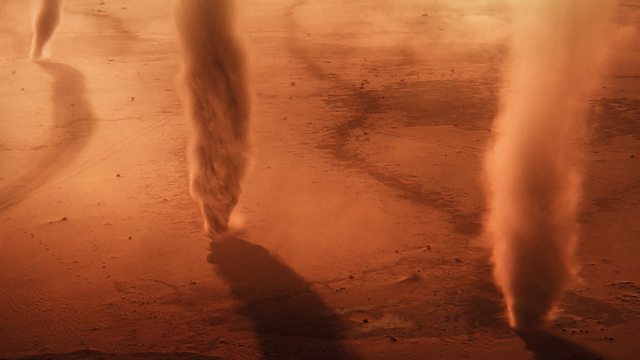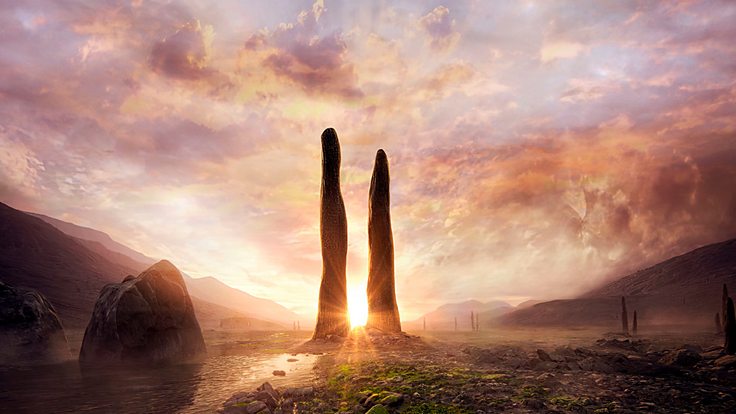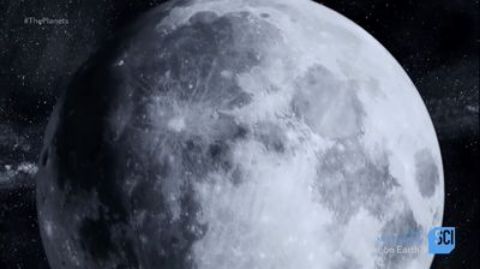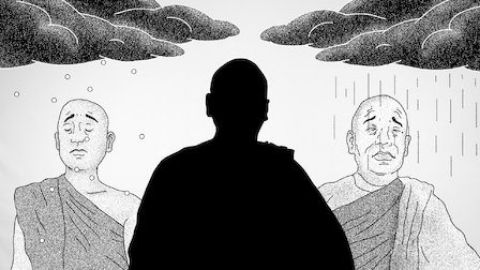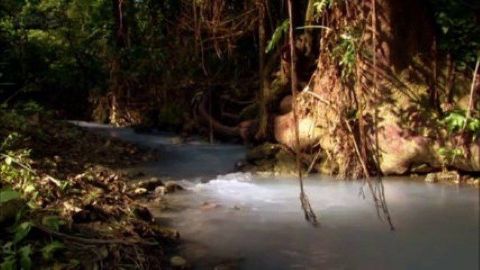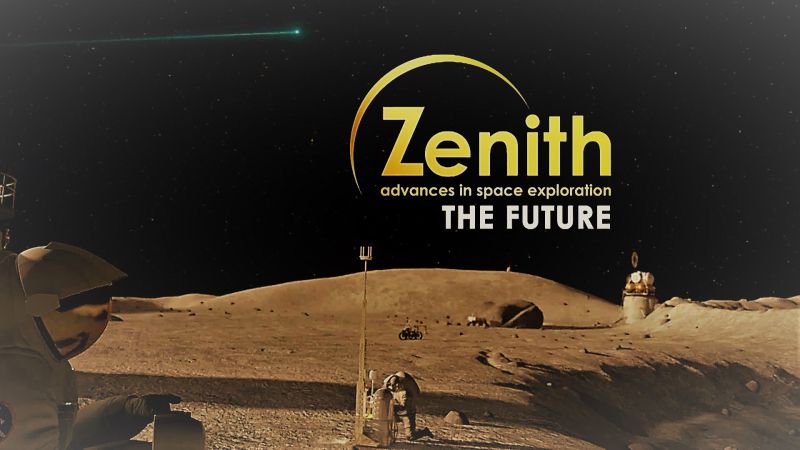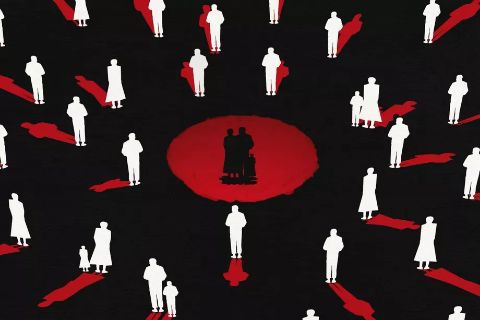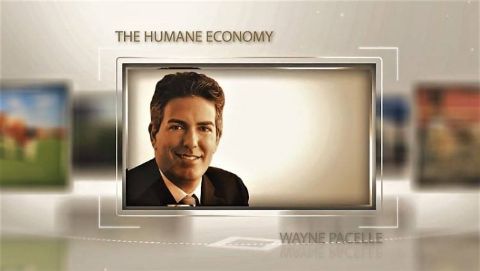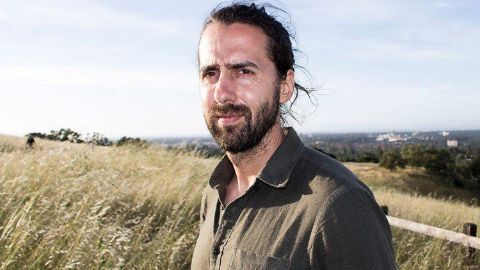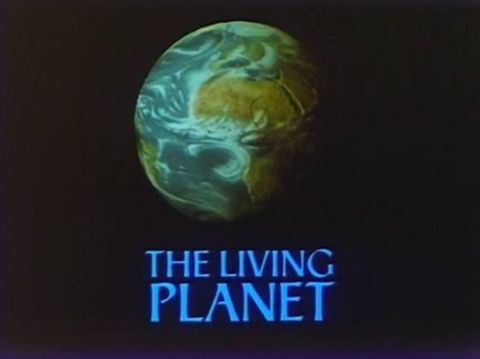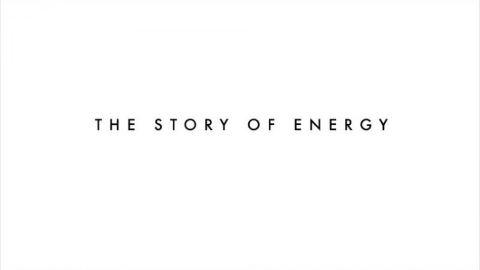The Messenger explores our deep-seated connection to birds and warns that the uncertain fate of songbirds might mirror our own. Moving from the northern reaches of the Boreal Forest to the base of Mount Ararat in Turkey to the streets of New York, The Messenger brings us face-to-face with a remarkable variety of human-made perils that have devastated thrushes, warblers, orioles, tanagers, grosbeaks and many other airborne music-makers. In ancient times humans looked to the flight and songs of birds to protect the future. Today once again, birds have something to tell us.
2015 • Nature
Tells the story of the Sinclair ZX Spectrum. This film goes into all the finer details of how and why the ZX Spectrum was created, what impact the computer had as well as the various versions that followed right the way through to the latest iteration of the system with the ZX Spectrum Next. Complete with interviews from industry legends.
2024 • Technology
Luminous tells the story of the first astronomer in history to publicly predict the near-future explosion of a star--will he be right? Others in the astronomical community are skeptical, and professional reputations hang in the balance. In production for five years, Luminous follows Larry Molnar's journey to test an unprecedented prediction, knowing that its success or failure will unfold squarely in the international spotlight.
2022 • Astronomy
When Apollo astronaut Gene Cernan stepped on the Moon in December 1972 he left his footprints and his daughter's initials in the lunar dust. Only now, over forty years later, is he ready to share his epic but deeply personal story of fulfillment, love and loss. Cernan's burning ambition carried him from a quiet Chicago suburb to the spectacular and hazardous environment of space, and ultimately, to the Moon. Five years in the making, The Last Man on the Moon unveils a wealth of rare archive material, and takes Cernan back to the launch pads of Cape Kennedy, to Arlington National Cemetery and to his Texas ranch, where he finds respite from a past that refuses to let him go.
2014 • Astronomy
The shocking story of Aum Shinrikyo, the doomsday cult that unleashed a deadly nerve gas in Tokyo's subway system in 1995. Founded by disillusioned yoga teacher Shoko Asahara, Aum transformed into a terrorist organization while Japan's police and media turned a blind eye. Featuring rare archival footage and an interview with one of Asahara's former high-ranking disciples.
2023 • People
The inside story of the tech entrepreneurs who created the social media app Twitter. At first the site grew on the back of celebrities who realised it offered them a direct way to communicate with fans. After going global, it seemed to be fulfilling the founders' dream of a digital utopia where all voices would be heard. But as hate speech and misinformation flooded the platform, the founders faced growing problems to control it - and the sale to Elon Musk in 2022 represented the end of their dream.
2025 • Technology
Explore Tulum, the final inhabited city of the Maya empire, where innovative archaeology and cutting-edge technology reveal the mysteries behind the collapse of one of Mesoamerica's greatest civilisations.
2023 • History
From battlefields and ancient swords to mighty castles and Durham cathedral, the rich, brutal story of William the Conqueror's journey from invader to ruler of England. Alice Roberts discovers who the Normans really were, tests a nearly thousand-year-old sword from William the Conqueror's time and wonders why there are so few women depicted in art from the time. Plus, Danielle George gets a brutal lesson in medieval 11th-century battlefield combat techniques, and Onyeka learns how William's coronation turned into a PR disaster.
S1E4 • Fortress Britain • 2022 • History
Tales of Cold War Britain, from nuclear threat to upper-class spies, eerie ghost bunkers and our very own Chernobyl. In Cold War military buildup Britain constructed bunkers for the civilian population and created its own nuclear missile defense. Professor Alice Roberts explores the UK's response to the threat of nuclear attack during the early years of the Cold War in the 1950s, when a network of upper-class spies began merrily sharing British military secrets with the Soviet Union. We also visit a nuclear-bomb-proof command center and inspect the legendary Avro Vulcan jet bomber.
S1E3 • Fortress Britain • 2022 • History
How Britain planned for a Nazi invasion - from tank traps and sticky bombs, to the Home Guard and tragic story of heroism. Alice Roberts looks for visible traces of Britain's rearmament in preparation for a German invasion. How did the Home Guard come about and what was the role of women in the offensive defense? We meet Indian-American Noor Inayat Khan, a special agent who worked with sabotage activities in German-occupied France, and hear her tragic story as one of the war's forgotten heroines. Alice learns about the deployment of the Home Guard, and Danielle travels to the Channel Islands, the only part of the British Isles under German control, to visit the only concentration camp built on British soil in Alderney. She explores life under occupation and visits the underground hospital Festung Guernsey.
S1E2 • Fortress Britain • 2022 • History
The story of Henry VIII's fear of Catholic Europe, told via his castles, cannons and spies. The first episode examines the surviving traces of Henry VIII's fear of invasion from Catholic Europe through physical reminders, including mighty castles and cannons, that survive to this day. At her headquarter in Walmer Castle, built in 1540 in Kent to defend the town against a French invasion, Alice gets her hands on a vast hoard of Tudor coins and a 500-year-old jousting scorecard, as she learns how Henry's greed and ambition led him to bankrupt the nation and lay the foundations for the modern secret service. Danielle visits Henry's mighty castle at Deal and witnesses the awesome power of the cannons built to defend England, while Onyeka gets within touching distance of the iconic Mary Rose.
S1E1 • Fortress Britain • 2022 • History
In 1966, drought and an exploding population confronted India with the imminent threat of a severe famine that many scientists and intellectuals feared was a harbinger of global catastrophes to come, as the world's population outstripped its ability to produce food. India turned to Norman Borlaug, an unassuming plant breeder from Iowa whose combination of scientific knowledge and raw determination had made him a legend among a small handful of fellow specialists. The Man Who Tried to Feed the World recounts the story of the man who would not only solve India's famine problem, but would go on to lead a "Green Revolution" of worldwide agriculture programs, saving countless lives. He was awarded the 1970 Nobel Peace Prize for his work but spent the rest of his life watching his methods and achievements come under increasing fire.
2020 • People
Professor Brian Cox explores the solar system’s wildest weather, encountering powerful lightning, strange metallic frosts and monsoon rains on a moon a billion kilometres from Earth.
S1E3 • Solar System • 2024 • Astronomy
In this episode, Chris Packham tells the miraculous story of how plant life turned Earth from a barren rock into a vibrant green world. A four billion year saga of extraordinary highs and lows that almost wiped out all life on the planet. Four billion years ago Earth was predominantly a water world, lacking land masses, with plant life’s early ancestors trapped on the seabed. Everything changed when a giant asteroid bombardment smashed into the young planet’s crust triggering plate tectonics - Earth’s extraordinary land building force. As opportunities on land grew, plants faced an epic struggle to establish themselves in a world dominated by giant eight metre fungi, overcoming death and dehydration and eventually creating the life-giving substance that would allow them to prosper: soil. But just as they seemed set to triumph, evolving into the amazing biological machines that are trees, they became the victims of their own success. Giant swamp forests sprang up, locking up so much carbon dioxide, that global temperatures plummeted sending Earth into one of its most terrifying chapters yet.
S1E3 • Earth: One Planet, Many Lives • 2023 • Nature
Astronaut Mike Massimino reveals the mysterious secrets of the moon, a world permanently tied to Earth; using new research, he uncovers the mysterious origin of the moon and how it kick-started life on Earth.
S1E8 • The Planets (US) • 2017 • Astronomy
Take a deep, cleansing breath and slowly exhale while being enlightened on the impact meditation can have on your mind and body.
S1E4 • The Mind, Explained • 2019 • Brain
The next programme explores the various sea-living invertebrates. In Morocco, the limestones are 600 million years old, and contain many invertebrate fossils. They fall broadly into three categories: shells, crinoids and segmented shells. The evolution of shelled creatures is demonstrated with the flatworm, which eventually changed its body shape when burrowing became a necessity for either food or safety. It then evolved shielded tentacles and the casings eventually enveloped the entire body: these creatures are the brachiopods. The most successful shelled animals are the molluscs, of which there are some 80,000 different species.
2/13 • Life on Earth • 1979 • Nature
Space technologies are continuing to be refined and access to space is becoming cheaper. This episode looks at the development of new human-rated spacecraft, reusable boosters, laser communications, the Ion Drive, and new techniques to refuel satellites in space.
S1E13 • Zenith: Advances in Space Exploration • 2021 • Technology
Fairy tales have survived thousands of years for a reason. Explore their far-flung history and how the stories speak to fundamental human concerns.
S3E14 • Explained • 2021 • Creativity
M.C. Escher is among the most intriguing of artists. In 1956 he challenged the laws of perspective with his graphic Print Gallery and his uncompleted master-piece quickly became the most puzzling enigma of modern art. Fifty years later, can mathematician Hendrik Lenstra complete it? Should he?
2007 • Creativity
Philippa Perry explores the 1890s, a decade in which the invention of motion pictures went hand in hand with a deep belief in the paranormal.
S1E3 • Victorian Sensations • 2019 • Creativity
Animated on location at a beach, in snow, and underwater, this stop-motion short details a transoceanic conversation between two characters via objects in a bottle.
In 2013, all of Norway celebrated the 150th anniversary of the birth of Edvard Munch, one of the towering figures of modern art. It was hailed a 'once-in-a-lifetime show'. This film goes behind the scenes to show the process of putting the exhibition together, as well as providing an in-depth biography of a man who lived from the mid-19th century right through to the German occupation of Norway in the Second World War.
S3E3 • Great Art • 2019 • Creativity
A look back at key events in TV, film, showbusiness and politics in 1984, a year when Spitting Image and The Young Ones revolutionised comedy and enraged the old guard. Conservative crusaders became hysterical over the horror of video nasties, and an attempt to silence pop band Frankie Goes to Hollywood backfired spectacularly. In politics, Margaret Thatcher faced a fierce year-long battle with striking coal miners and the Conservative Party was hit by a deadly terrorist attack in Brighton. Narrated by Jan Leeming and featuring contributions from John Thomson, Cheryl Baker, Steve Nallon, Edwina Currie, Matthew Parris and Martin Bell.
S1E2 • Controversially: That Was the Year that Was • 2023 • Economics
Cory Booker and others discuss how slavery, housing discrimination and centuries of inequality have compounded to create a racial wealth gap.
Controversies, scandals and surprises from the year, with Grange Hill tackling the issue of heroin addiction and EastEnders introducing a gay couple to Albert Square. Screenwriter Dennis Potter's drama The Singing Detective won over the critics, but its sex scenes and nudity upset moral campaigner Mary Whitehouse, while cricketer Ian Botham caused a storm after confessing that he'd smoked marijuana. Narrated by Jan Leeming, with contributions from Mark Little, Nick Ferrari, Cheryl Baker, Nick Hewer, Danny John-Jules and Nina Wadia.
S1E3 • Controversially: That Was the Year that Was • 2023 • Economics
Wayne Pacelle, President of the Humane Society of the United States, draws a practical roadmap for how we can use the marketplace to promote the welfare of all living creatures, and how industries, innovators and consumers are coming together in this powerful social movement.
S1E6 • Curiosity Retreats: 2016 Lectures • 2016 • Economics
Jamie Bartlett reveals how Silicon Valley's mission to connect the world is disrupting democracy, helping plunge us into an age of political turbulence. Many of the Tech Gods were dismayed when Donald Trump - who holds a very different worldview - won the American presidency, but did they actually help him to win? With the help of a key insider from the Trump campaign's digital operation, Jamie unravels for the first time the role played by social media and Facebook's vital role in getting Trump into the White House. But how did Facebook become such a powerful player? Jamie learns how Facebook's vast power to persuade was first built for advertisers, combining data about our internet use and psychological insights into how we think. A leading psychologist then shows Jamie how Facebook's hoard of data about us can be used to predict our personalities and other psychological traits. He interrogates the head of the big data analytics firm that targeted millions of voters on Facebook for Trump - he tells Jamie this revolution is unstoppable. But is this great persuasion machine now out of control? Exploring the emotional mechanisms that supercharge the spread of fake news on social media, Jamie reveals how Silicon Valley's persuasion machine is now being exploited by political forces of all kinds, in ways no one - including the Tech Gods who created it - may be able to stop.
S1E2 • Secrets of Silicon Valley • 2017 • Economics
Jan Leeming narrates a look at controversies, scandals and surprises in TV, film, music and politics in 1988, including Salman Rushdie's book The Satanic Verses igniting a literary and religious firestorm and Ian Paisley daring to heckle the Pope. On the global stage, US president Ronald Reagan and USSR leader Mikhail Gorbachev reshaped geopolitics, while a soundbite from Tory MP Edwina Currie dented the UK's confidence in eggs, leading to a nationwide salmonella scare.
S1E4 • Controversially: That Was the Year that Was • 2023 • Economics
Attenborough goes underwater to observe the ocean's life forms and comment on them at first hand.
11/12 • The Living Planet • 1984 • Nature
Professor Jim Al-Khalili discovers the intriguing story of how we discovered the rules that drive the universe. (Part 1: The Story of Energy) Energy is vital to us all, but what exactly is energy? In attempting to answer this question Jim investigates a strange set of laws that link together everything from engines to humans to stars. It turns out that energy, so critical to daily existence, actually helps us make sense of the entire universe.
S1E1 • Order and Disorder • 2012 • Physics
After finding a broken surfboard on his local beach, Jhonny Guerrero, a teenager from one of Peru's toughest barrios, sets his heart on becoming a professional surfer. With his father in prison for armed robbery and a mother struggling to feed and clothe his younger brother, the sea is his escape. When Jhonny is spotted by Peru's most successful surf champion, Sofia Mulanovich, he is taken under her wing and given a chance to succeed. Yet the pressure to do so weighs hard. Without his dad around, the lure of his friends and the risks of life in the barrios threaten to jeopardise everything he has worked for. When he's injured outside a nightclub in a drive-by shooting, Jhonny is forced to decide once and for all which path to take. AKA En La Tormenta.
2021 • People
Are electric cars, solar panels, wind turbines conserving earth's resources and putting an end to pollution? Quite the contrary; these technologies rely on rare minerals and add pressure on their resources. Mining for them releases radioactive substances & refining them needs thousands of gallons of water. Global leaders are aware of this. Why are they withholding the whole truth about green tech?
2020 • Environment
Fearing Saigon's collapse, President Lyndon B. Johnson authorizes the bombing of North Vietnam and sends U.S. ground troops to the south.
S1E3 • The Vietnam War • 2017 • History
The launch of the BBC's ambitious seven-year natural history project, in which six presenters visit six of the planet's most threatened ecosystems to meet the people fighting to restore the Earth's delicate balance. Chapter 1: Steve Backshall travels to the Maldives, an area facing significant challenges because of climate change. Warming seas and the acidification of the oceans have led to coral bleaching on a massive scale, destroying the surrounding ecosystem. The biodiversity of the reefs provides food security, income and other benefits to the people of the Maldives, and Steve finds that they are working hard to try to stem the tide of destruction. He also goes diving off the reefs to check on a group of manta rays, whose presence offers a clear indication of the health of the reef. In Iceland, Chris Packham learns more about the effects of global warming. Temperatures in the Arctic are rising at more than twice the annual global average. Snow and ice are melting at an increasing rate, which contributes to rising sea levels and is likely to provoke extreme temperature events beyond the Arctic. As one of the eight Arctic States, Iceland is being dramatically affected by rising temperatures, with the lives and livelihoods of many islanders being threatened. Chris also discovers that melting sea ice is opening the Arctic to navigation. These seas are home to many species of whales, so Chris joins a team of young scientists monitoring the impact of increased commercial shipping on humpback whales. On the other side of the world, Ella Al-Shamahi visits Cambodia in Southeast Asia, an area experiencing increasing economic growth. However, growth is putting massive pressure on natural resources, with ever-expanding cities and devastating overexploitation of the natural world. The Mekong river is the lifeblood of this region, but whole sections of it are under pressure. Ella meets a fishing community living on the Tonle Sap lake. The lake used to offer rich fishing grounds for local communities, but the construction of many dams along the wider Mekong is now threatening to destroy the biodiversity of this once abundant lake. The building of new roads has given poachers easier access to forests, and the illegal wildlife trade is big international business. Ella visits a project in Cambodia that rescues and rehabilitates illegally trafficked wildlife, including pangolins, the most trafficked mammal on Earth. Chapter 2: Liz Bonnin travels to California to learn about the increasingly invasive wildfires hitting the headlines. Scientists can see clear links between the fires, climate change, raised temperatures and an extended drought season. There is one crucial element that is key to a sustainable future in California: biodiversity. Loss of keystone species and large carnivores is a threat to the state's ecosystems, and conservationists and scientists are mobilising to save wildlife from wildfires and to treat their burns. Liz also visits the Pacific coast of California, where warming seas have brought with them a new resident, great white sharks. With each shark consuming up to 18 kilos of prey at a time, the impact they could have on the marine ecosystem is being studied intently. Ade Adepitan travels to Kenya to look at the effects rising temperatures are having on the land. Hundreds of millions of Africans depend on rainfall to grow their food and keep livestock, and the capacity for adaptation is low. Ade also visits a project in Kenya that is going to extraordinary lengths to safeguard the future of its most charismatic creature, the African elephant. Over in Brazil, Gordon Buchanan discovers a pioneering project that is trying to save one of the Amazon's iconic predators, the jaguar. Brazil is the most biodiverse country in the world, and as well as the Amazon rainforest, it is home to one of the world's most important wetlands, the Pantanal. This area is home to high numbers of jaguars, but in 2020, wildfires destroyed 30 per cent of the Pantanal, killing an estimated 17 million animals. More than a quarter of the resident jaguars were directly impacted by these fires, through habitat loss, food shortages, injury and death.
2022 • Environment
